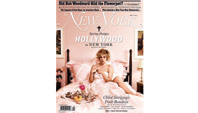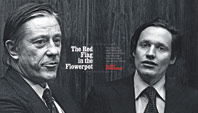
1. In her annual “Spring Design” issue, Wendy Goodman offered a glimpse of how Hollywood stars live when they reside on the East Coast (“Hollywood, New York,” May 7). “How am I supposed to get any work done today when this @NYMag #Hollywood spring #design issue has arrived?” tweeted @MilkandBond. Many readers zeroed in on their personal favorites among the glamour homes. “Of course Chloë Sevigny lives in an East Village garden co-op decorated to the nines by a Bowery interior decorator,” wrote Annie Georgia Greenberg at Refinery 29. “It’s a mix of aesthetics that work. Also touching? The story of her ex-boyfriend moving out and taking with him all the photos of the couple, leaving only one framed postcard of Jesus. Ah, the hipster breakup.” On Twitter, @ohjustjess fawned over a different home: “holy crap. Zach Braff’s bathroom. i want to go to there,” she tweeted. “The brick walls are my favorite, vintage dining room table is perfect! Just manly enough,” wrote a commenter on nymag.com about Braff’s loft. “I’d also take Greta Gerwig’s apartment,” tweeted @laurafleur. “It has a cat.”
2. Mitt Romney may have won the GOP presidential nomination, but the most powerful man in the party is probably Congressman Paul Ryan, Jonathan Chait wrote in an appraisal of the “Wonk King of the Republicans”—in part, Chait suggested, because Ryan’s sunny, pragmatic temperament has blinded observers to his more extreme positions (“The Legendary Paul Ryan,” May 7). “The thing that comes across, more than anything, is the degree to which so many people simply don’t believe that Ryan is a right-wing ideologue,” noted Jamelle Bouie at The American Prospect. “It explains how an extremist like Ryan can capture the attention of the media and not be called out on his radical agenda,” wrote Cathleen Carrigan on the Current TV War Room blog. “An excellent piece,” agreed Paul Krugman on his blog, the Conscience of a Liberal. About the curious esteem for Ryan among centrists (which puzzles Krugman, too), he wrote, “The real story here isn’t so much about Ryan as it is about the fundamental unseriousness of the Very Serious, who are in their own way just as much about striking a pose.” But not everyone was convinced Ryan wasn’t himself serious. “Ryan is only a radical if you believe that the answer to every problem in America is more government spending,” wrote one commenter on nymag.com. And another: “You can argue all you want against Rep. Ryan’s budget plan; at least he has a long-term plan.”

3. An excerpt from an upcoming book about Ben Bradlee by Jeff Himmelman revealed the longtime Washington Post editor had lingering doubts about some of the more theatrical details of Bob Woodward and Carl Bernstein’s Watergate reporting, as presented in All the President’s Men (“The Red Flag in the Flowerpot,” May 7). The story let loose a storm of chatter inside the Beltway, where Deep Throat remains a vital part of the capital’s mythology. Woodward defended himself vigorously, citing another interview in which Bradlee was much more supportive, and calling the story “a classic case of manufactured controversy, as best I can tell.” And Bradlee felt compelled to affirm his faith in the overall quality of Woodward’s reporting: “I always trusted him, and I always will.” But readers harbored doubts. “That’s a damning story: A much admired editor questioning a history-making piece of reporting,” wrote Alexander Abad-Santos at the Atlantic Wire. “Woodward is overreacting ferociously, perhaps because he fears for his legacy,” wrote Alex Pareene at Salon. And yet: “Go ahead—try to blame Woodward for his reaction,” argued Erik Wemple on his blog for the Washington Post. “Here is a reporter whose pivotal professional triumph is being questioned by his own boss, a revelation that comes to him some 40 years after the fact. That’s powerful enough on its own. Consider, too, that the news comes via an assistant who Woodward had essentially placed in the Bradlee archive. What Bradlee was expressing was a hunch. He has no facts to back up his ‘residual fear,’ at least none that he has divulged. In other words, they’re what a good editor would call unpublishable material or a smear.”
4. In a profile of Toni Morrison, Boris Kachka found the 81-year-old Nobel laureate (who was born Chloe Wofford and thinks of “Toni Morrison” as a public fiction) wrestling with her place in literary history now that the forces of multiculturalism that helped make her a celebrity have died down somewhat (“Who Is the Author of Toni Morrison?,” May 7). “Toni Morrison is right to not want to be lumped into the collective ‘Black Female Author’ bag,” wrote one commenter at nymag.com. “She is a singular talent.” Another was even more emphatic: “Ms. Wofford—you are the definitive American writer (not just black, woman, or other).”
Send correspondence to: nymletters@nymag.com